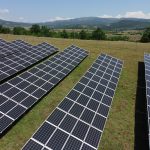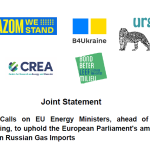Greta Thunberg and activists from Fridays for Future are joining the climate strike organised by the indigenous Saami youth who are taking the EU to court over its weak 2030 climate target.
Today’s climate strike organised by the Sáminuorra (the indigenous Saami youth association in Sweden) is following the Saami national day that marks the 102nd anniversary of the first Saami congress, representing the indigenous people of northern Europe. The Saami people, living in the Arctic, see their traditional way of living, based on reindeer herding under threat due to the devastating impacts of the climate crisis. Hence, the Saami youth association, together with 10 other plaintiffs, is taking the EU to court over its weak 2030 climate target.
According to data from the Swedish Meteorological and Hydrological Institute, the Arctic region faces exceptional weather conditions making impacts of climate change very visible. Since a decade, due to warm winter months, snow is often replaced by rain. When the rain is followed by cold weather; it turns the soil into a thick layer of ice and the reindeer can’t dig into it to get their food. Besides wildfires hitting Saami grazelands during summer, current precipitation changes are hugely affecting the Saami way of living and culture which is centered around reindeer herding.
Sanna Vannar, president of the Saami Youth Association, Sáminuorra said: “Every Saami is affected by the climate crisis. As indigenous Saami people, our lives, our tradition, our culture depends on nature. Every day it is becoming more and more difficult to read the signs of nature where to find fish, where to bring our reindeer for herding. As Saami youth, we fight for climate justice on our lands, in the streets and in the court.”
Greta Thunberg said: “The solutions to the climate crisis must contain the knowledge and wisdom of indigenous peoples. We have much to learn from those who live by and through nature and have done so for thousands of years. We stand in solidarity with your struggles, for they are also our struggles.”
French farmer, Maurice Feschet who joined the Sami youth to take the EU to court said : “It is unacceptable that EU leaders put the entire Saami culture and young generations at risk by failing to step up climate action. As a 74 years old grandfather and their co-plaintiff in the People’s Climate Case, I stand in solidarity with the Saami youth and others whose future depends on urgent climate action.”
The historic People’s Climate Case has been rejected by the European General Court as the Court decided that the plaintiffs are not unique to be hit by the climate crisis and therefore shouldn’t be allowed to take a case to court. The families and Saami youth appealed this decision to the European Court of Justice in July 2019.
Wendel Trio, Director of Climate Action Network (CAN) Europe said: “EU leaders must understand that increasing immediate climate action, through substantially enhancing the 2030 climate target, is no longer a political or technical debate. It is about protecting indigenous rights, people’s lives, livelihoods, families and future.
Today, the European Commission has a concrete opportunity to propose a much higher 2030 target well before the summer to prove that the EU cares about its citizens.”
ENDS
MEDIA CONTACTS:
Goksen Sahin, CAN Europe Communication Coordinator, goksen@caneurope.org, +32 468 45 39 20
NOTES:
Timeline of the People’s Climate Case:
24 May 2018: The People’s Climate Case is filed to the European General Court by10 families and the Sami youth association, Sáminuorra.
13 August 2018: the European General Court published the case in the Official Journal of the European Union and proceedings officially started.
24 September 2018: CAN Europe, Wemove.eu and the German Small Farmers Association (Arbeitsgemeinschaft bäuerlicher Landwirtschaft e.V.) applied to court to intervene in the People’s Climate Case.
15 October 2018: First written defence of the European Parliament and the Council are submitted to the Court.
10 December 2018: Plaintiffs answered the EU’s defence and the written procedure is closed.
15 May 2019: The European General Court decided that the case cannot be taken to European Courts as the plaintiffs are not unique to be hit by the climate crisis 11 July 2019: Plaintiffs filed appeal to the European Court of Justice on the dismissal of the People’s Climate Case



